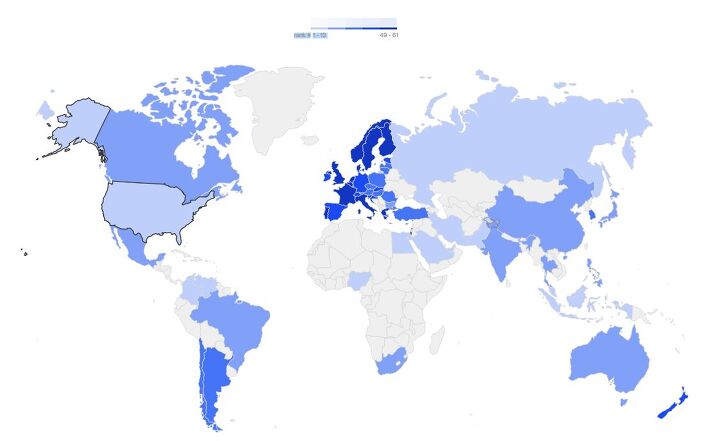Global Gas Prices: Where Do We Fit?

You’ve no doubt noticed that gas prices have been creeping up while 2018 progresses. But North America still has it pretty good, especially the United States. Despite fuel prices creeping up to almost $3.00 per gallon, the U.S. still enjoys cheaper gasoline than most of the Western world. Even Canada, which is currently coasting around $4.45 per gallon, manages to undercut the nightmare that is Europe by a wide margin.
North America as a whole spends more on gas per person then practically everywhere else on the globe, though. An affinity for larger vehicles, combined with more time spent behind the wheel, translates into burning more fuel overall. I suppose one could make the argument that we need cheaper petroleum since we use so much of it — just be ready to have someone call you selfish.
For example, the United Kingdom has prices set around $6.59 for a gallon of that good stuff but the average citizen only uses 69.67 gallons a year. However, the average American turns 429 gallons of gasoline into forward motion.
Bloomberg recently ran a study in which it compared average fuel prices between 61 countries, looking specifically at the per-gallon prices, how that price compares to wages in each country, and how much of it each citizen is burning in a standard year.
The results are fascinating, at least until you start looking at Iran and realize the country sells fuel for less than a dollar per gallon. Then you’re forced to take a momentary break to come to grips with your anger.
Gas prices were sourced by GlobalPetrolPrices.com to determine fuel pricing, which is useful but imperfect since gas isn’t the same around the world. The outlet also said it used U.N. data for motor gasoline by road in 2015 to determine average fuel consumption per annum. Again, imperfect for a 2018 analysis, but it’s probably still the most comprehensive collection of prices and what they mean in a broader context that we’ve come across. Check it out for yourself if you want to see where individual nations stack up.

A staunch consumer advocate tracking industry trends and regulation. Before joining TTAC, Matt spent a decade working for marketing and research firms based in NYC. Clients included several of the world’s largest automakers, global tire brands, and aftermarket part suppliers. Dissatisfied with the corporate world and resentful of having to wear suits everyday, he pivoted to writing about cars. Since then, that man has become an ardent supporter of the right-to-repair movement, been interviewed on the auto industry by national radio broadcasts, driven more rental cars than anyone ever should, participated in amateur rallying events, and received the requisite minimum training as sanctioned by the SCCA. Handy with a wrench, Matt grew up surrounded by Detroit auto workers and managed to get a pizza delivery job before he was legally eligible. He later found himself driving box trucks through Manhattan, guaranteeing future sympathy for actual truckers. He continues to conduct research pertaining to the automotive sector as an independent contractor and has since moved back to his native Michigan, closer to where the cars are born. A contrarian, Matt claims to prefer understeer — stating that front and all-wheel drive vehicles cater best to his driving style.
More by Matt Posky
Latest Car Reviews
Read moreLatest Product Reviews
Read moreRecent Comments
- Jalop1991 is this anything like a cheap high end German car?
- HotRod Not me personally, but yes - lower prices will dramatically increase the EV's appeal.
- Slavuta "the price isn’t terrible by current EV standards, starting at $47,200"Not terrible for a new Toyota model. But for a Vietnamese no-name, this is terrible.
- Slavuta This is catch22 for me. I would take RAV4 for the powertrain alone. And I wouldn't take it for the same thing. Engines have history of issues and transmission shifts like glass. So, the advantage over hard-working 1.5 is lost.My answer is simple - CX5. This is Japan built, excellent car which has only one shortage - the trunk space.
- Slavuta "Toyota engineers have told us that they intentionally build their powertrains with longevity in mind"Engine is exactly the area where Toyota 4cyl engines had big issues even recently. There was no longevity of any kind. They didn't break, they just consumed so much oil that it was like fueling gasoline and feeding oil every time


































Comments
Join the conversation
A One Dollar per Gallon Federal Deficit Tax will not cover half of the interest due on 20 Trillion.
"The results are fascinating, at least until you start looking at Iran and realize the country sells fuel for less than a dollar per gallon. Then you’re forced to take a momentary break to come to grips with your anger." What, exactly, am I supposed to be angry about? That an oil-rich country is able to provide low-cost gas to its domestic market? Sure, some of that is political but some of it is also lower overhead since it's not being shipped thousands of miles before being refined and then hundreds of miles before being sold to the customer. When I lived in upstate NY farm country, things like milk, butter, and eggs were cheaper for the same reasons.